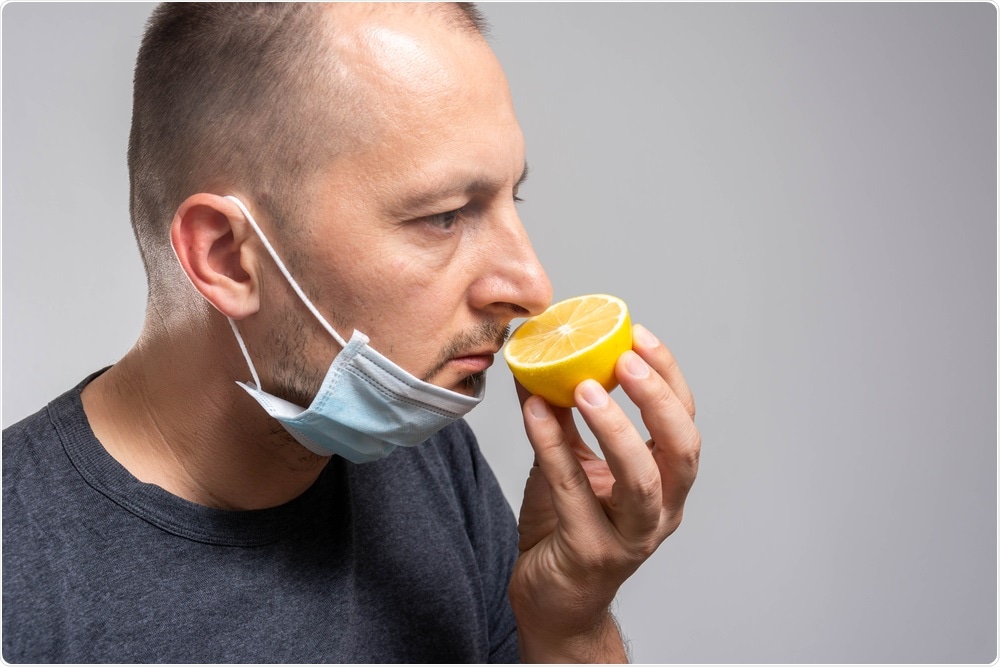Firstly, after official recognition by the WHO and subsequently, the UK government, it was about showing just how common smell dysfunction was. Pooled evidence showed an incidence of about 60% of those being infected with COVID-19.
Surveying healthcare workers led us to discover that many were being infected due to the lack of recognition of smell loss or the fact that it might be the first symptom or the only symptom present. Global data showed that affected people were also reporting true taste disturbances as well as chemesthesis (burning/tingling in the nose).
We were also able to show that on formal testing, there were distinct differences between those infected with COVID-19 and those who had suffered a common cold previously; with the former showing their sense of smell to be worse affected and having changes in bitter and sweet tastes.
Ongoing global data collection has shown that at 40 days from the onset of COVID-19, about 50% of people have fully recovered their sense of smell and it is estimated that about 10% of those infected fail to show any recovery.

Smell Loss. Image Credit: Nenad Cavoski/Shutterstock.com
Please can you recap what causes smell loss, also known as anosmia, in respiratory tract viruses in general, and COVID-19 specifically?
The most common cause for smell loss is chronic sinusitis (with or without nasal polyps), followed by respiratory viruses, head injury, and neurological disorders such as Parkinson’s disease.
Viruses typically cause havoc by infecting the smell nerves (olfactory receptor neurons (ORNs) but in COVID-19 it appears that the virus is infecting the supporting cells around the ORNs and disturbing the smell receptor layer; there is some evidence to suggest the virus may also infect deeper into the brain in some cases.
Your latest paper is titled 'Clinical Olfactory Working Group Consensus Statement on the Treatment of Post Infectious Olfactory Dysfunction'. Please outline these recent findings.
This paper was designed to summarise the knowledge on treating smell disorders caused by viruses including, but not exclusively, COVID-19. It involved a discussion of international experts who treat smell and taste disorders as well as a review of the published evidence to date.
We agreed that the best treatment to recommend is smell training and that Vitamin A drops may also be a treatment option. It was felt that steroids probably do not have a role in treatment but may help to exclude other problems such as rhinitis that are blocking the nose.
What was the methodology behind your research, and how representative are your findings of the general population who have suffered from COVID-19?
The consensus statement was a systematic review of the literature followed by a survey of the experts and a round-table discussion before formulating agreed treatment paradigms. The majority of the studies considered will have addressed non-COVID cases.
This research is based on smell loss in both COVID-19 and non-COVID-19 patients. How have you applied your findings to COVID-19?
The coronavirus family has previously been implicated in smell loss, so treatment options for all viruses are felt to apply to COVID-19 at this time.
What is ‘smell training’ therapy?
Several studies have been done in recent years which suggest that repeated short-term exposure to smells can potentially be of benefit to people who have been affected by olfactory loss, particularly those who have lost their sense of smell as the result of a virus such as the common cold.
Attempts have been made to categorize smells in the same way that tastes have been classified as being sweet, sour, salty, and bitter. Studies suggest you choose scents to represent the four smell categories of Flowery, Fruity, Spicy, and Resinous. However, you can choose any smell you feel comfortable with, have available, and enjoy.
To perform smell training, there are different items from the home that provide a range of smells – try to select things that you know you found to be pleasant and/or have a connection with. Lemon and orange rind, nutmeg, clove, mint, eucalyptus, ground coffee, coconut, and vanilla are all items you can use.
You can use the raw material (e.g smell directly from the pepper grinder, rip a sprig of fresh herbs) or you can use small bowls or jars (ramekins, clean glass spice, or baby food jars are ideal).
Please see www.fifthsense.org.uk for more details.
Please explain neuroplasticity and its role in smell training.
Neuroplasticity is the ability of neural networks in the brain to change through growth and reorganization. We believe smell training stimulates the turnover of ORNs with evidence on previous studies of enlargement of the smell pathways by measurement of the olfactory bulbs.
Why are the researchers involved in this paper heavily advocating smell training over minocycline antibiotics?
Simply there is no supporting evidence for minocycline whilst there is a reasonable body of evidence for smell training.
What have you found regarding Vitamin A therapy?
Vitamin A is an option used by many of the experts – there is some limited evidence to support it, albeit that further trials are needed to underline this.
How can your conclusions be used to treat those who are suffering from long-term smell loss (termed medically as post-infectious olfactory dysfunction or PIOD)?
There is guidance for both GPs and ENT specialists on how to manage these patients when they seek advice.
What will the logistics of rolling out this form of therapy for COVID-19 patients be and when will it become available?
Smell training is available now – www.fifthsense.org.uk. Vitamin A can also be bought online.
We hope to be conducting further research on vitamin A this year.

Vitamins. Image Credit: Saowanee K/Shutterstock.com
How could your research help prepare for potential respiratory virus pandemics in the future?
It is difficult to say – anosmia being such a key feature of COVID-19 was unexpected. However, it does emphasize that other symptoms than just a cough and fever (which are very non-specific) can be relevant in alerting us to those who might be infected.
What is the next step for your research into COVID-19 and anosmia?
Some of our next research includes:
- Vitamin A study
- Complete the smell training in the COVID study
- Assessing the impact of smell loss in long-COVID
- Development of psychological and nutritional support for those with lasting symptoms
Where can readers find more information?
About Professor Carl Philpott
Professor Philpott is a Professor of Rhinology and Olfactology at the University of East Anglia and an Honorary Consultant Ear, Nose & Throat Surgeon and Rhinologist. He was appointed in February 2010 and established the UK’s first Smell & Taste Clinic at the James Paget University Hospital that now receives referrals from around the country.
He is a graduate of Leicester University Medical School and completed his basic surgical training in the University Hospitals of Leicester before undertaking a period of research into developing apparatus for testing the sense of smell. His specialist training was completed in East Anglia, during which time he spent a year at the St Paul's Sinus Centre in Vancouver, Canada learning advanced skills in endoscopic sinus surgery for inflammatory diseases of the nose and sinuses as well as tumors of the sinuses and anterior skull base. He also spent time at the Dresden University Smell and Taste Clinic learning techniques for assessing and researching the sense of smell.
Professor Philpott’s main clinical interests include the management of smell and taste disorders, the medical and surgical treatment of chronic rhinosinusitis, allergic fungal rhinosinusitis, and other sino-nasal disorders, including post-traumatic problems with the nose. He is the course director of the East Anglian Sinus, Orbit, and Skull Base Surgery Course and is an invited instructor and speaker at other sinus surgery courses and meetings and the Dresden Smell & Taste Course.
He leads a multi-center, multi-disciplinary team for research into chronic rhinosinusitis (CRS) worth £3.2 million over 7 years (2016-23), the largest NIHR Programme Grant budget to be funded to date. He also leads the NIHR James Lind Alliance Priority Setting Partnership on Smell & Taste Disorders (https://www.jla.nihr.ac.uk/priority-setting-partnerships/smell-and-taste-disorders/).
Professor Philpott has specific expertise in the field of Rhinology and Olfactory and Gustatory Disorders and lectures at local, regional, national, and international venues on these subjects. He has evaluated the latest evidence through the Cochrane ENT Group producing nine systematic reviews on nasal disorders including rhinosinusitis and rhinitis.
He has published books/chapters that have been sold internationally and published research in the top-ranking specialty journals with 298 publications including 133 peer-reviewed publications; Altimetric scores show an international readership and reach. He is an invited speaker at international conferences and on the editorial board of two leading specialty journals.
His research leadership roles and collaborations include:
- Local Specialty Lead NIHR CRN Eastern
- PPI Champion NIHR CRN ENT
- Director, British Rhinological Society (BRS) Research Group
- President, British Otorhinolaryngology & Allied sciences Research Society (BOARS)
- Professional Lead, James Lind Alliance Priority Setting Partnership for Smell & Taste Disorders
- National commissioning guidelines for rhinosinusitis 2016
- EUFOREA Rhinology Research Forum 2016
- Position Paper on Olfactory Dysfunction 2017
- Chronic Rhinosinusitis Outcome Measures (CHROME) 2018
- European Position Paper on Sinusitis 2020
- Clinical Olfactory Working Group – initiated and led consensus document in 2020
Sources:
- Rocke J, Hopkins C, Philpott C, et al. Is loss of sense of smell a diagnostic marker in COVID-19: A Systematic Review and Meta-analysis. Clin Otolaryngol 2020 2020/08/01. DOI: 10.1111/coa.13620.
- Lechner M, Chandrasekharan D, Jumani K, et al. Anosmia as a presenting symptom of SARS-CoV-2 infection in healthcare workers - A systematic review of the literature, case series, and recommendations for clinical assessment and management. Rhinology 2020 2020/05/09. DOI: 10.4193/Rhin20.189.
- Lechner M, Liu J, Counsell N, et al. Course of symptoms of loss of sense of smell over time in one thousand forty-one healthcare workers during the Covid-19 pandemic: Our experience Clinical Otolaryngology 2020; Accepted and in press.
- Lechner M, Patel ZM, Philpott C, et al. Olfactory Loss of Function as a Possible Symptom of COVID-19. JAMA Otolaryngol Head Neck Surg 2020 2020/07/16. DOI: 10.1001/jamaoto.2020.1589.
- Lechner M, Counsell N, Liu J, et al. Anosmia and hyposmia in health-care workers with undiagnosed SARS-CoV-2 infection. The Lancet Microbe 2020; 1: e150. DOI: 10.1016/S2666-5247(20)30096-3.
- Parma V, Ohla K, Veldhuizen MG, et al. More than just smell - COVID-19 is associated with severe impairment of smell, taste, and chemesthesis. medRxiv 2020: 2020.2005.2004.20090902. DOI: 10.1101/2020.05.04.20090902.
- Huart C, Philpott C, Konstantinidis I, et al. Comparison of COVID-19 and common cold chemosensory dysfunction. Rhinology 2020 2020/08/19. DOI: 10.4193/Rhin20.251.
- Gerkin RC, Ohla K, Veldhuizen MG, et al. Recent smell loss is the best predictor of COVID-19 among individuals with recent respiratory symptoms. Chem Senses 2020 2020/12/25. DOI: 10.1093/chemse/bjaa081.
- Kattar N, Do TM, Unis GD, et al. Olfactory Training for Postviral Olfactory Dysfunction: Systematic Review and Meta-analysis. Otolaryngol Head Neck Surg 2020: 194599820943550. 2020/07/14. DOI: 10.1177/0194599820943550.
- Pekala K, Chandra RK, and Turner JH. Efficacy of olfactory training in patients with olfactory loss: a systematic review and meta-analysis. Int Forum Allergy Rhinol 2016; 6: 299-307. 2015/12/01. DOI: 10.1002/alr.21669.
- Hummel T, Stupka G, Haehner A, et al. Olfactory training changes electrophysiological responses at the level of the olfactory epithelium. Rhinology 2018; 56: 330-335. 2018/08/05. DOI: 10.4193/Rhin17.163.
- Negoias S, Pietsch K and Hummel T. Changes in olfactory bulb volume following lateralized olfactory training. Brain Imaging Behav 2017; 11: 998-1005. DOI: 10.1007/s11682-016-9567-9.